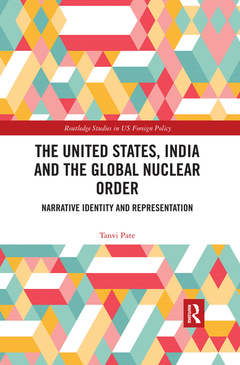The United States, India and the Global Nuclear Order Narrative Identity and Representation Routledge Studies in US Foreign Policy Series
Auteur : Pate Tanvi

In the Post-Cold War era, US nuclear foreign policies towards India witnessed a major turnaround as a demand for ?cap, reduce, eliminate? under the Clinton administration was replaced by the implementation of the historic ?civil nuclear deal? in 2008 by Bush, a policy which continued under Obama?s administration.
This book addresses the change in US nuclear foreign policy by focusing on three core categories of identity, inequality, and great power narratives. Building upon the theoretical paradigm of critical constructivism, the concept of the ?state? is problematised by focusing on identity-related questions arguing that the ?state? becomes a constructed entity standing as valid only within relations of identity and difference. Focusing on postcolonial principles, Pate argues that imperialism as an organising principle of identity/difference enables us to understand how difference was maintained in unequal terms through US nuclear foreign policy. This manifested in five great power narratives constructed around peace and justice; India-Pakistan deterrence; democracy; economic progress; and scientific development. Identities of ?race?, ?political economy?, and ?gender?, in terms of ?radical otherness? and ?otherness? were recurrently utilised through these narratives to maintain a difference enabling the respective administrations to maintain ?US? identity as a progressive and developed western nation, intrinsically justifying the US role as an arbiter of the global nuclear order.
A useful work for scholars researching identity construction and US foreign and security policies, US-India bilateral nuclear relations, South Asian nuclear politics, critical security, and postcolonial studies.
Introduction. 1 Reconceptualising Theory and Methodology of Foreign Policy: Narrative, State Identity and Action from a Critical Constructivist-Postcolonial Viewpoint 2 Creating American Nuclear Subjectivity: ‘Atoms for Peace’ in the Campaign for a New Global Nuclear Order 3 Is India a Capable Nuclear Power? The Changing Characteristics of India as the ‘Other’ (1947-1992) 4 Establishing a Post-Cold War Global Nuclear Order: The Bill Clinton Administration’s Conflicting Images of India as the ‘Other’ (1993-2001) 5 Nuclear America in a Post-9/11 World: India as the ‘Other’ in the Narratives of George W. Bush Administration (2001-2009) 6 America as the Leader of Non-Proliferation: The Continuation of US-India Nuclear Partnership during Barack Obama Administration (2009-2017) 7 Understanding the Complexity of Identity/Difference: Analysing Great Power Narratives of Bill Clinton, George W. Bush and Barack Obama Administrations from a Postcolonial Viewpoint. Conclusion
Tanvi Pate is a Visiting Fellow in the Department of Politics and International Studies, University of Warwick. Her research interests include critical approaches to international relations and security with a focus on India's bilateral relations, India and the global order and South Asian politics.
Date de parution : 04-2020
15.6x23.4 cm
Date de parution : 06-2018
15.6x23.4 cm
Mots-clés :
Global Nuclear Order; United States; Great Power Narratives; India; Nuclear Foreign Policy; Nuclear Weapons; Foreign Policy Texts; George W Bush; Great Power Identity; Nuclear India; Global Nuclear; Civil Nuclear Deal; Indian Actors; Civil Nuclear; Radical Otherness; International Nuclear Order; Overt Nuclear; Nuclear Engagement; Multilateral Export Control Regimes; Clinton’s Visit; Administration’s Nuclear Policies; Nuclear Policies; Indian Nuclear Policies; Narrative Identity; Start Ii; Free Nations; post-Cold War Strategic Environment; Nuclear Relations; NPT Regime



